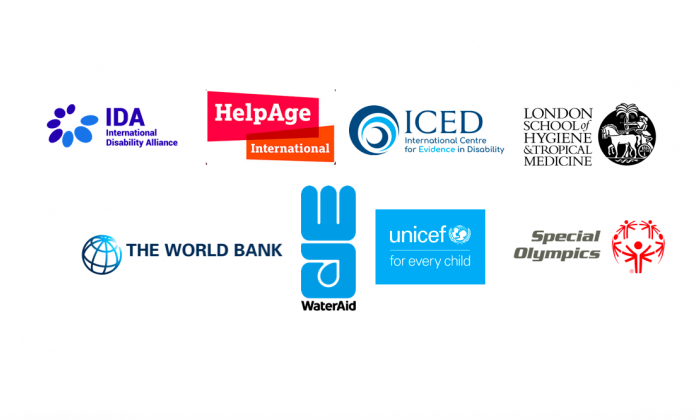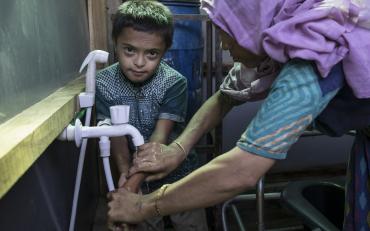Access to clean drinking Water, Sanitation, and Hygiene (WASH) is a human right, further reinforced by the United Nations Convention on the Rights of Persons with Disabilities (CRPD).
WASH services also play a key role to ensure the ability to exercise other human rights and fundamental freedoms for all persons with disabilities including women and girls, children, and older persons with disabilities. WASH investments must include persons with disabilities to meet the Sustainable Development Goals and leave no one behind.
Persons with disabilities face additional barriers to access WASH in situations of risk and humanitarian emergencies such as conflict, displacement and disasters. While it is crucial to ensure climate-resilient WASH as a part of global climate action, it is important to ensure that disability-inclusion and accessibility is not undermined.
This web page has been set up as a joint collaboration by the International Disability Alliance (IDA), the United Nations Children’s Fund (UNICEF), the World Bank, WaterAid, HelpAge International, the Special Olympics, and the International Centre for Evidence in Disability (ICED) at the London School of Hygiene & Tropical Medicine to signpost and share resources on WASH and disability from different organisations working in development and humanitarian contexts.
The resources include practical guidelines and policy briefs and are for a range of policy and practitioner audiences. The selection of resources will be reviewed and updated on a regular basis.
While the organizers make every effort to ensure that the shared resources follow rights-based approaches to disability and are provided in accessible formats, we wish to acknowledge that due to high volume of material we cannot fully guarantee best quality of all the resources. However, any suggestions to improve current resources will be highly appreciated.
For further information or to share more resources please contact:
Martina Nee, Equality and Inclusion Advisor, WaterAid, +46-(0)8-677 30 19, +46-(0)73-312 22 76, martina.nee [at] wateraid.semartina.nee [at] wateraid.se ( )
Elham Youssefian, Inclusive Humanitarian Action and Disaster Risk Reduction Adviser, The International Disability Alliance, +1 347 3208729, eyoussefian [at] ida-secretariat.org
Disability-inclusive WASH resources (in Word with more information)
General WASH
Disability Inclusive WASH Practices: Including people with disabilities in UNICEF WASH programming, UNICEF
The Case for Investment in Accessible and Inclusive WASH, UNICEF
Advocating for Investment in Accessible and Inclusive WASH, UNICEF
Local Experiences for Global Learnings on Disability Inclusive WASH, UNICEF
An accessible future: three key changes for disability-inclusive water, sanitation and hygiene (from WWW workshop 2019), WaterAid, HURIWD, ECDD, Amplify Change, UNICEF, SIDA, WB
Compendium of accessible WASH technologies, WaterAid, WEDC, SHARE
Equality, non-discrimination and inclusion in WASH: a toolkit, WaterAid
Equality, inclusion and rights framework, WaterAid
Accessibility and safety audits for water points and for latrines in households, schools and markets, WaterAid and WEDC
3 short animations on inclusive WASH, tackling barriers, and a human rights based approach, WaterAid
- What is inclusive and empowering WASH?
- Understanding and tackling barriers
- How do we take a rights-based approach to WASH?
Four short animations introducing the concept of how to do an accessibility and safety audit, how to do a barrier analysis how to partner with a DPO, and how to identify people with disabilities using the Washington group questions, WaterAid Cambodia and Epic Arts
- How to do an accessibility and safety audit
- How to identify people with disabilities
- How to do a barrier analysis
- How to partner with a DPO
Water Currents: Inclusive WASH, Globalwaters.org
Towards a disability inclusive WASH: A spotlight on people with intellectual disability, Special Olympics
Definition of inclusive WASH, LSHTM
Including Persons with Disabilities in Water Operations, World Bank
Scaling Up Disability Inclusion in Water Projects: Case Study of PAMSIMAS, World Bank
WASH in Humanitarian Action
Guidance: Including children with disabilities in humanitarian action - WASH, UNICEF
Disability-Inclusive Humanitarian WASH Response – Jordan, UNICEF
Rapid Review of Disability and Older Age Inclusion in Humanitarian WASH Interventions, Elrha
Humanitarian Inclusion Standards WASH section, HelpAge, CBM et al
COVID-19 Response
COVID-19 response: Considerations for Children and Adults with Disabilities, UNICEF
Summary report on considering disability and ageing in COVID-19 hygiene promotion programmes, COVID-19 Hygiene Hub Resources, LSHTM
Inclusive WASH COVID Guidance, HelpAge
Summary report on considering disability and ageing in COVID-19 hygiene promotion programmes (similar content to the disability evidence brief), LSHTM
COVID-19 Inclusive WASH Checklist, LSHTM
Menstrual Health and Hygiene
Guidance on Menstrual Health & Hygiene, UNICEF
The Bishesta Campaign: menstrual health and hygiene for people with intellectual impairments, WaterAid, LSHTM
Guidance Note: Menstrual Health and Hygiene for Girls and Women with Disabilities, UNICEF
Topic guide on disability and menstrual health and hygiene to be used to gather qualitative evidence, LSHTM
Topic guide to interview a proxy about MHH for people with disabilities, LSHTM
Quantitative Survey Tools
Case control questionnaire, LSHTM
Household screening questionnaire, LSHTM
Sanitation
Female-friendly public and community toilets: a guide for planners and decision makers, WaterAid, WSUP, UNICEF
Frontiers of CLTS: Disability: Making CLTS Fully Inclusive, IDS Sanitation Learning Hub
How to talk about Incontinence – Checklist, IDS Sanitation Learning Hub
Frontiers of Sanitation: Incontinence: We Need to Talk About Leaks, IDS Sanitation Learning Hub
Topic guide on incontinence experienced by people with and without disabilities, LSHTM
Topic guide to interview a proxy about incontinence experienced by people with disabilities, LSHTM
WASH in Healthcare Facilities
A participatory management tool for user-friendly water sanitation and hygiene in health care facilities, Cambodia, WaterAid Cambodia

